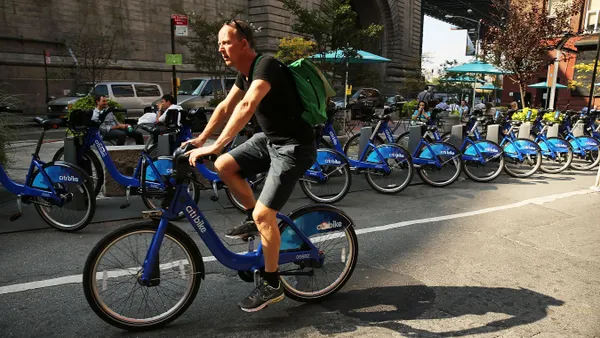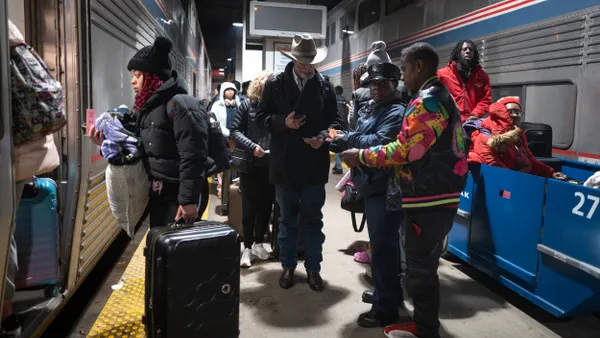Dive Brief:
- A new poll from Partners for Automated Vehicle Education (PAVE) found nearly three in four Americans think autonomous vehicle (AV) technology is "not ready for primetime," while 48% said they would "never" get in an autonomous taxi or ride-sharing vehicle. The poll was issued to 1,200 adults across the U.S. between Feb. 27 and March 5.
- Fifty-eight percent of the respondents believe safe AVs will be available in 10 years once the technology has matured, and only 20% believe they will never be safe. Those attitudes do not seem to be tied to high-profile safety incidents involving AVs, however: 88% of respondents said they knew either "nothing at all" or "a little" about the 2018 Tempe, AZ crash involving an Uber AV and a pedestrian.
- The poll did find an openness among Americans with disabilities toward trying an AV. Of those surveyed, people with disabilities were more likely to agree that the advantages of AVs outweigh the disadvantages, and were more likely to agree that AVs will help "mobility challenged individuals go places they cannot get to today."
Dive Insight:
Public perception of AVs continues to be a hot topic as uncertainty looms around the technology, including concerns about safety and rollout. The public is progressing in its acceptance of AVs, though: A survey from infrastructure engineering firm HNTB found last June that 57% of respondents would be willing to ride in them, while a separate survey from Adobe Analytics found millennials and Gen Z hold much of the public interest in AVs.
On a PAVE-hosted webinar to coincide with the release of the survey results, Kelly Nantel, VP of Roadway Practice at the National Safety Council and PAVE’s vice-chair, said continued consumer education will be crucial to keep up with the pace of new AV technologies and availabilities.
"There's no doubt that exposure to AVs and education about AVs and technology is really critical in moving forward on this effort," Nantel said. "I don't think you can overstate the importance of consumer education and giving people experience, a sneak peek, a better and deeper understanding of the technology."
Webinar speakers said a big part of that consumer education must be about demonstrating how AVs work and giving people the opportunity to ride in them. There have already been limited public-facing opportunities to introduce AVs to riders, including the Waymo One service in Phoenix, and autonomous shuttle services in a variety of U.S. cities. Nantel said those experiments and pilot programs are key to help build public trust, especially in a new technology.
"Any time there's a major transformative innovation, there’s this pattern of 'Show me, don't just tell me, show me, help me understand it,'" she said. "That is prevalent in any type of transformative innovation in the history of human beings. We're creatures of habit, and we like what we know and we're comfortable."
The PAVE survey demonstrates how far AV technology still has to go before it will be more widely accepted by the public, and before federal and local elected officials settle on appropriate regulatory frameworks.










